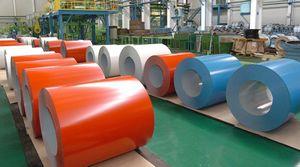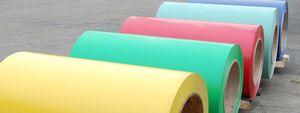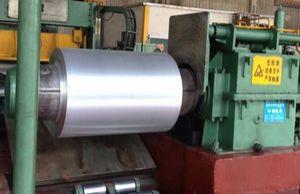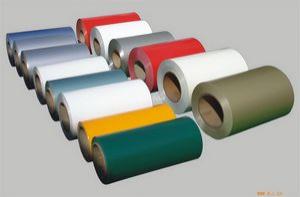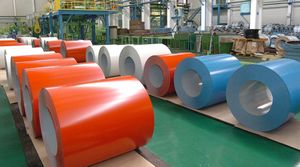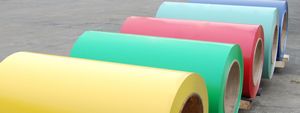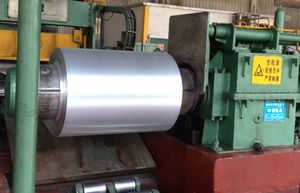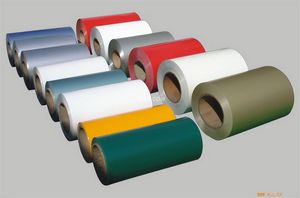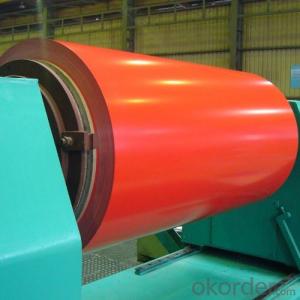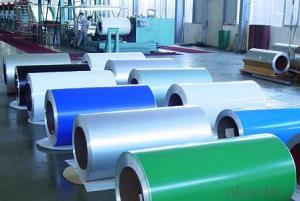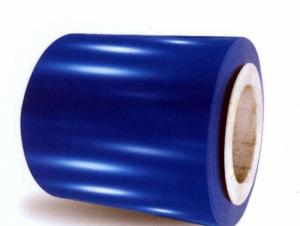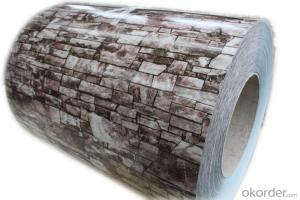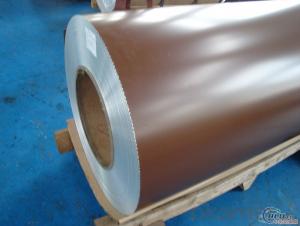PVDF Painted AA 3003 Coated Aluminum Coil
- Loading Port:
- China Main Port
- Payment Terms:
- TT OR LC
- Min Order Qty:
- -
- Supply Capability:
- -
OKorder Service Pledge
Quality Product, Order Online Tracking, Timely Delivery
OKorder Financial Service
Credit Rating, Credit Services, Credit Purchasing
You Might Also Like
supply Mill-finished / coated aluminum plate/sheet/ coil:
Alloy: AA1050,1060,1100,1200,2024,3003,3304,3005,3015,5052,5086,5754,5083,6061,7050,7475,8011, etc
Temper: O, H14/16/18/22/24/32/ H112/H321/T6,T851,T7451,T7351, etc
Thickness: 0.02mm—20mm
Width: 100mm—2000mm (Can be slitted)
Notice: PE coating / PVDF coating / Embossment can be done if required.
Alloy: AA1050,1060,1100,1200,2024,3003,3304,3005,3015,5052,5086,5754,5083,6061,7050,7475,8011, etc
Temper: O, H14/16/18/22/24/32/ H112/H321/T6,T851,T7451,T7351, etc
Thickness: 0.02mm—20mm
Width: 100mm—2000mm (Can be slitted)
Notice: PE coating / PVDF coating / Embossment can be done if required.
- Q: Can aluminum coils be used in the manufacturing of appliances?
- Yes, aluminum coils can be used in the manufacturing of appliances. Aluminum coils offer several advantages such as being lightweight, corrosion-resistant, and having good thermal conductivity, making them suitable for various appliance applications including refrigerators, air conditioners, and heating systems.
- Q: What is the shelf life of aluminum coils?
- The shelf life of aluminum coils can vary depending on various factors such as storage conditions, protective coatings, and exposure to environmental elements. However, in general, aluminum coils can have a shelf life of several years if stored properly in a dry, cool, and non-corrosive environment.
- Q: What is the role of aluminum coils in the construction of sports stadiums?
- Aluminum coils play a crucial role in the construction of sports stadiums due to their various beneficial properties. First and foremost, aluminum is known for its lightweight nature, making it an ideal choice for large-scale structures like stadiums. The use of aluminum coils in the construction of stadiums allows for easier transportation and installation, reducing construction time and costs. Furthermore, aluminum is highly resistant to corrosion, which is a significant advantage in an outdoor environment where stadiums are often exposed to harsh weather conditions. This corrosion resistance ensures the longevity and durability of the stadium's structure, minimizing maintenance and repair costs over time. Moreover, aluminum coils offer excellent thermal conductivity, meaning they efficiently transfer heat, allowing for effective temperature regulation within the stadium. This is particularly important in modern stadiums that require climate control systems to ensure comfort for both players and spectators. Additionally, aluminum is highly malleable and can be easily formed into various shapes and sizes, allowing for flexibility in the design and construction of stadiums. This versatility allows architects and engineers to create innovative and visually appealing structures, enhancing the overall aesthetic experience for visitors. In summary, the role of aluminum coils in the construction of sports stadiums is multifaceted. They provide a lightweight, corrosion-resistant, thermally conductive, and malleable material that allows for efficient construction, durability, comfort, and aesthetic appeal.
- Q: Can you create a tank, AFV, IFV etc. from aluminium or is this just a stupid idea that would kill everyone inside?
- Sure. The Vickers Mk 7 export tank had a turret of aluminum with composite armor layered over and mounted on a Leopard II hull. The M113 armored personel carrier, the most produced armored vehicle since WWII was made from aluminum as have been many other light armored vehicles. The protection these vehicles provide is limited to small arms fire however. Aluminum can't keep out large caliber projectiles and spalls badly against HEAT ammunition.
- Q: What are the different sizes available for aluminum coils?
- The sizes available for aluminum coils can vary depending on the manufacturer and specific requirements. However, common sizes range from narrow coils with widths as small as 0.2 inches to wider coils with widths up to 72 inches. The thickness of these coils can also vary, typically ranging from 0.006 to 0.25 inches.
- Q: What are the strength properties of aluminum coils?
- The strength properties of aluminum coils include high tensile strength, excellent formability, and good resistance to corrosion. Aluminum coils have a high strength-to-weight ratio, making them a preferred choice in various industries such as automotive, aerospace, and construction. They exhibit good resistance to fatigue and are capable of withstanding heavy loads without deformation or breakage. Additionally, aluminum coils offer excellent formability, allowing for easy shaping and bending without compromising their structural integrity. Moreover, aluminum's natural oxide layer provides a protective barrier against corrosion, making aluminum coils highly resistant to rust and other forms of degradation. Overall, the strength properties of aluminum coils make them a versatile and reliable material for a wide range of applications.
- Q: so i have a dirtbike and i wanted to polish the swing arm.i have 100 grit,400,800 and 1200.i use to 100 to take off the coating the swing arm has and once its off its like a natural aluminum left.well i polished it before and it came out real good to a mirror finish.well i did the other half of the swing arm exactly the same even with new sand paper and it just didnt shine like the other half!i wet sanded it and i used car wax as my buffing compound,yes i used a soft buffing wheel.the car wax works really good!thats how i got the first half to a mirror shine but the other half just wasnt working for me.any suggestions?oh and i sanded in all one direction.
- Use 1200 to 2000 grit. Your sandpaper is way too course! The paper probably got gummed up With aluminum particals. Use water or oil to wash away particals. In other words wet sand it. Then get this polish called Mothers Aluminum Polish. And two micro fiber cloths. Use the mothers and wipe off with first towel. Then use second towel. Trust me! I spend alot of time in my machine shop making custom aluminum parts. If you can trickle water over the surface of what your polishing it helps. The 1200 to 2000 grit can be purchased at Walmart in the auto section.
- Q: What are the different color options for anodized aluminum coils?
- The different color options for anodized aluminum coils include silver, gold, bronze, black, blue, red, green, and various shades of gray.
- Q: Will the aluminum braking surface dissipate heat evenly allowing for fast stops from fast descents or will I have to still pulsate braking to reduce heat build up in the tires and tubes?
- Aluminum is tried and true, basalt seems like a gimmick. Aluminum's light, it's sought after over steel, which is cheaper and heavier and stronger. No basalt, no need.
- Q: How are aluminum coils protected against corrosion?
- Aluminum coils are protected against corrosion through various methods. One common method is the application of a protective coating or finish on the surface of the coil. This coating acts as a barrier, preventing the contact of the aluminum surface with moisture, oxygen, and other corrosive elements present in the environment. The coating can be a layer of paint, anodizing, or a specialized protective film. Another method used for protecting aluminum coils against corrosion is the process of alloying. By adding small amounts of other metals such as copper or zinc to the aluminum, it enhances the corrosion resistance of the alloy. These alloyed metals create a protective oxide layer on the surface of the aluminum, which acts as a shield against corrosion. In addition to coatings and alloying, proper cleaning and maintenance of aluminum coils are crucial for preventing corrosion. Regular cleaning helps remove any contaminants or corrosive substances that may have accumulated on the surface of the coils. This ensures that the protective coatings or oxide layers remain intact and effective in preventing corrosion. Furthermore, proper installation and sealing of aluminum coils are essential to protect them against corrosion. Effective sealing prevents moisture or other corrosive agents from entering the coil's interior, which can lead to corrosion over time. Overall, a combination of protective coatings, alloying, regular cleaning, and proper installation techniques play a vital role in safeguarding aluminum coils against corrosion, ensuring their longevity and optimal performance.
Send your message to us
PVDF Painted AA 3003 Coated Aluminum Coil
- Loading Port:
- China Main Port
- Payment Terms:
- TT OR LC
- Min Order Qty:
- -
- Supply Capability:
- -
OKorder Service Pledge
Quality Product, Order Online Tracking, Timely Delivery
OKorder Financial Service
Credit Rating, Credit Services, Credit Purchasing
Similar products
Hot products
Hot Searches
Related keywords
